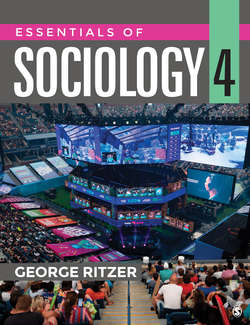Читать книгу Essentials of Sociology - George Ritzer - Страница 44
На сайте Литреса книга снята с продажи.
Max Weber
ОглавлениеAlthough Karl Marx was an important social theorist, he developed his ideas outside the academic world. It took time for those radical ideas to gain recognition from scholars. In contrast, Max Weber (1864–1920; pronounced VAY-ber) was a leading academician of his day (Kalberg 2011, 2017). Weber, like Marx, devoted great attention to the economy.
Weber’s best-known work—The Protestant Ethic and the Spirit of Capitalism ([1904–1905] 1958)—is part of his historical-comparative study of religion in various societies throughout the world. One of his main objectives was to analyze the relationship between the economy and religion. Weber focused on the central role religion had played in the Western world’s economic development.
Beginning in the seventeenth century, it was Protestantism in general, and especially Calvinism, that led to the rise of capitalism in the West and not in other areas of the world. Calvinists believed that people were predestined to go to heaven or hell; that is, they would end up in heaven or hell no matter what they did or did not do. While they could not affect their destiny, they could uncover “signs” that indicated whether they were “saved” and going to heaven. Economic success was a particularly important sign that one was saved. However, isolated successful economic successes were not sufficient. Calvinists had to devote their lives to hard work and economic success, as well as to other “good works.” At the same time, the Calvinists were quite frugal. All of this was central to the distinctive ethical system of the Calvinists, and more generally Protestants, that Weber referred to as the Protestant ethic.
Weber was interested not only in the Protestant ethic but also in the “spirit of capitalism” it helped spawn. The Protestant ethic was a system of ideas closely associated with religion, while the spirit of capitalism involved a transformation of those ideas into a perspective linked directly to the economy. As the economy came to be infused with the spirit of capitalism, it was transformed into a capitalist economic system. Eventually, however, the spirit of capitalism, and later capitalism itself, grew apart from its roots in Calvinism and the Protestant ethic. Capitalist thinking eventually could not accommodate such irrational forms of thought as ethics and religion.
Despite his attention to it, Weber was not interested in capitalism per se. He was more interested in the broader phenomenon of rationalization, or the process by which social structures are increasingly characterized by the most direct and efficient means to their ends. In Weber’s view, this process was becoming more and more common in many sectors of society, including the economy, especially in bureaucracies and in the most rational economic system—capitalism. Capitalism is rational because of, for example, its continual efforts to find ways to produce more profitable products efficiently, with fewer inputs and simpler processes. A specific and early example of rationalization in capitalism is the assembly line, in which raw materials enter the line and finished products emerge at the end. Fewer workers performed very simple tasks in order to allow the assembly line to function efficiently. More recently, manufacturers have added more rational, “lean” production methods, such as the just-in-time inventory system (Janoski 2015). Instead of storing extra components in case they are needed, the just-in-time system relies on the delivery of materials when they are needed in the production process. This makes for highly efficient use of storage space and the funds needed to purchase materials.
Weber saw rationalization as leading to an “iron cage” of rationalized systems. Such a cage makes it increasingly difficult for people to escape the process. This gives a clear sense of his negative opinion of rationalization.
Such a negative view of rationalization and its constraints and socially harmful effects has persisted. It is frequently portrayed in popular entertainment, including George Orwell’s novel, and later movie, Nineteen Eighty-Four (1949), as well as movies such as Brazil (1985), V for Vendetta (2005), the Hunger Games series (2012–2015), and television programs like The Handmaid’s Tale (2017–present) and Black Mirror (2011–present).
Ask Yourself
Efforts to exploit, alienate, and control us continue to this day. Is only capitalism to blame for this? Are there causes to be found in even larger systems in the modern world? Or are more microscopic sources, such as the nature of human beings, responsible for these efforts?
In sum, while for Marx the key problems in the modern world were the exploitation and alienation that are part of the capitalist economy, for Weber the central problem was the control that rationalized structures such as capitalism exercise over us in virtually all aspects of our lives. Furthermore, while Marx was optimistic and had great hope for socialism and communism, Weber was a pessimist about most things. Socialism and communism, he felt, would not eliminate or prevent the iron cage from enveloping us: “Not summer’s bloom lies ahead of us, but rather a polar night of icy darkness and hardness, no matter which group may triumph externally now” (Weber [1919] 1958, 128).
